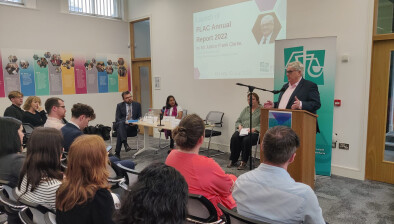No constitutional bar to collective bargaining laws, research shows

Sinéad Gibney
There is no constitutional bar to the introduction of a statutory framework and protections for collective bargaining, according to new research by the Irish Human Rights and Equality Commission.
Ireland is currently an outlier among European countries in not protecting an entitlement to engage in collective bargaining, and in its low rates of collective bargaining.
This can have a particular impact on structurally vulnerable groups, such as care workers, lone parents and low-paid workers in the hospitality and service industries, and their access to decent work and living standards.
The Commission advises that a statutory framework and protection for collective bargaining is now essential, regardless of whether the right to collective bargaining is specifically recognised in the Constitution.
A new report, Collective Bargaining and The Irish Constitution — Barrier or Facilitator?, points out that both the EU Charter and European Convention on Human Rights protect collective bargaining and that it can credibly be argued the ”Irish Constitution may be a facilitator and even a driver of protecting these rights”.
The study notes that although there were previously constitutional barriers to such a protection related to delegation of legislative power, these were greatly reduced in a landmark Supreme Court judgment in 2021.
Authored by law experts from Oxford and Trinity universities, this research is published at a time of significant developments at EU level.
Ireland is required to transpose the Directive on Adequate Minimum Wages in the European Union by November 2024, which includes a legal obligation on member states with less than 80 per cent of the workforce covered by collective bargaining agreements to adopt measures to increase coverage.
Currently, less than 35 per cent of Ireland’s workforce are protected by such agreements.
As the Irish Constitution itself provides for the supremacy of EU law over national law, the Commission says it is clear that legislation needs to be swiftly progressed.
Chief commissioner Sinéad Gibney said: “The right to join a union and bargain collectively for better pay and conditions is central to a healthy democracy. Workers’ rights are key to accessing a range of other rights, including healthcare and housing.
“People working long hours at minimum or low wage, with precarious job security, often lacking the right to strike or unable to access the protection of a union, are extraordinarily vulnerable to poverty. It is vital that the State now steps up, brings us into line with EU norms, and delivers on its obligations to Irish workers.”









